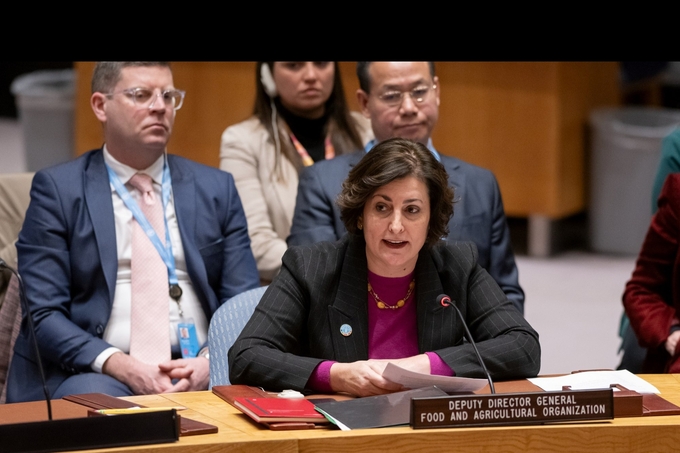November 25, 2025 | 11:36 GMT +7
November 25, 2025 | 11:36 GMT +7
Hotline: 0913.378.918
November 25, 2025 | 11:36 GMT +7
Hotline: 0913.378.918

FAO Deputy Director-General Beth Bechdol delivers remarks at the United Nations Security Council High-Level Open Debate.
Climate crisis and conflicts are becoming increasingly intertwined, feeding into one another to perpetuate hunger and poverty. Urgent action and innovative solutions are required to address global food insecurity, said Deputy Director-General of the Food and Agriculture Organization of the United Nations (FAO) Beth Bechdol on Tuesday at the United Nations Security Council High-Level Open Debate.
The event entitled “The Impact of Climate Change and Food Insecurity on the Maintenance of International Peace and Security”, the signature event of Guyana’s presidency, was chaired by President Mohamed Irfaan Ali of Guyana bringing together over 80 Member States. United Nations Secretary-General António Guterres delivered his opening remarks stressing that climate disasters and conflict both inflame inequalities, imperil livelihoods, and force people from their homes.
The other briefers included Executive Secretary of the United Nations Framework Convention on Climate Change (UNFCCC) Simon Stiell; and Jimena Leiva Roesch, the Director of Global Initiatives and Head of Peace, Climate, and Sustainable Development at the International Peace Institute.
Farmers bear the brunt of climate impacts
In her address, Bechdol pointed out that increasing temperatures, changing precipitation patterns and greater frequency of climate extremes were becoming more intense, compromising food security and stability.
“The climate crisis spares no one, but it does not affect everyone equally or in the same way,” she said. “We know that the populations at greatest risk are those that depend on agriculture and natural resources – they live in rural areas and they are farmers themselves.” The Deputy Director-General added that such populations were also prone to disputes arising from the scarcity of natural resources.
According to the 2023 Global Report on Food Crises, 258 million people in 58 countries are facing high levels of acute food insecurity (IPC Phase 3 or above), with over two-thirds or 174 million people falling under this category because of climate and conflict.
“Climate change will undo progress made in alleviating hunger, but as it intensifies it will create further disruptions and continue to be a driver of conflict”, she said, noting that according to some projections, 10 percent of the currently suitable area for major crops and livestock could be climatically unsuitable by mid-century under high emission scenarios.
To this end, Bechdol highlighted the need for equipping farmers and communities with tools to prepare for, and respond to, these crises and to recover quickly from them. “We are seeing the results of our efforts in building resilience of rural communities in places like Afghanistan”, she said, pointing to the decline of the population facing acute food insecurity in the country.
Addressing the interlinked threats
Bechdol underscored the importance of the Secretary-General’s Peacebuilding Fund which has been responding to the need to address the intersection of climate change and conflict, and the effects of heightened competition over natural resources, and reiterated FAO’s commitment to support these types of projects and strengthen collaboration with partners.
She also spoke about the complexity of the relationship between climate change and conflict, citing as an example the conflicts between herders and pastoralists in West and Central Africa due to altered migratory routes causing growing competition for already scarce natural resources.
In Yemen, FAO has implemented a water for peace project which has helped to mitigate water-based conflicts – with women as conflict-resolution agents. Through cash for work, participating communities have protected areas where water flows during rainfall and rehabilitated irrigation canals. Farming communities engaged, under the project, to resolve local conflicts over water allocation.
Since climate change and the security risks it presents know no geographical boundaries, cooperation is needed at all levels to ensure the peaceful and sustainable management of shared resources, Bechdol noted.
Five critical actions
The Deputy Director-General outlined five critical actions to address climate-conflict nexus:
Bechdol concluded by stressing that agriculture cannot be neglected. It is a key solution to the growing threats from climate change, conflict and their impacts on food security. “It is time to focus on farmers, on pastoralists, on fisherfolk, on foresters – we cannot afford to leave anyone behind,” she said.
(FAO)

(VAN) Brazil's COP30 presidency pushed through a compromise climate deal on Saturday that would boost finance for poor nations coping with global warming but that omitted any mention of the fossil fuels driving it.

(VAN) Poultry farmers in the UK have been warned that they could face one of the worst winters yet for bird flu.

(VAN) Prices of main-crop paddy have risen sharply, with jasmine rice hitting 16,100 baht per tonne — the highest level in years.

(VAN) In Brazil, FAO unveiled a series of reports and initiatives showing how sustainable agrifood systems are a solution to the climate crisis.

(VAN) With names like neodymium and dysprosium, rare-earth elements sound exotic — and their perceived scarcity has only added to the mystique.

(VAN) In a new study published in Trends in Biotechnology, researchers used a gene-editing technology called CRISPR to increase a fungus's production efficiency and cut its production-related environmental impact by as much as 61%- all without adding any foreign DNA.

(VAN) A top official in Beijing’s Cop delegation says China is committed to clean energy – but US’s absence is a problem.